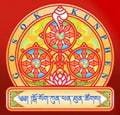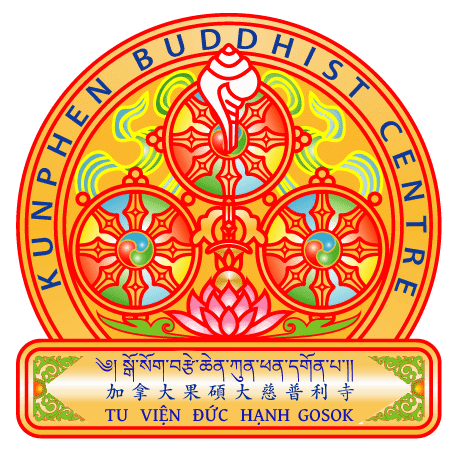Benefits and Merits of Prostrations

請點這裡進入 « 大禮拜的功德 » 中文頁面
Please click here for the Chinese Version
Gosok Rinpoche Dharma Teaching 2010
Accumulating Merit and Purifying Negativities
The practice of prostrations is part of the seven limb offering, which focuses on accumulating merit and purifying negativities. « Accumulating merit » refers to gathering wisdom and merit, while « purifying negativities » means cleansing the karmic obstacles accumulated over countless lifetimes. Whether a practitioner’s mind can generate realizations depends on their practice of accumulating merit and purifying negativities. Without such practices, no realizations will arise in the mind.
Three Types of Prostrations: Body, Speech, and Mind
The first branch of the sevenfold offering is « prostration, » which can be performed through body, speech, and mind:
- Prostration of the body : Physically bowing down to the Buddha.
- Prostration of speech : Praising the virtues of the Buddha with words.
- Prostration of the mind : Generating unwavering faith in the Buddha.
Whether practicing according to the seven limb offering or performing full prostrations, one must follow the methods taught by the lineage masters. Only by practicing correctly can one achieve the goal of accumulating merit and purifying negativities.
Proper Method of Prostration
To perform prostrations properly, begin by placing your palms together with your thumbs tucked into the center of your palms. The hollow space in the palms symbolizes the dependent origination of emptiness, which is crucial for future spiritual attainments. This practice creates the causes for obtaining a precious human rebirth during the time of the Buddha’s teachings or even after his passing.
- Palms at the crown of the head (or forehead) : This generates the cause for attaining the Buddha’s perfect physical form, including the 32 major marks and 80 minor signs of enlightenment. Placing the hands here specifically creates the cause for attaining the Buddha’s ushnisha (crown protuberance) or the white hair between the eyebrows.
- Palms at the throat : This creates the cause for attaining the Buddha’s 60 melodious qualities of speech.
- Palms at the heart : This creates the cause for realizing the Buddha’s omniscient mind, known as « all-knowing wisdom. »
Next, place your hands on the ground, kneel, and touch your forehead to the ground, completing the five-point prostration (hands, knees, and forehead). This method follows the Vinaya’s guidelines on karma. Every detail must be performed correctly; otherwise, the prostration may still accumulate merit but will have deficiencies. For example, offering a flower to the Buddha brings great merit, but if the flower is wilted, it diminishes the offering. Similarly, improper prostrations create negative conditions that practitioners should avoid.
Counteracting Pride
When performing full prostrations, the essence of the practice lies not just in physical actions or verbal recitations but in generating sincere faith and devotion. Future attainments depend on whether this faith is present. By practicing prostrations correctly, one not only accumulates the virtues of the Buddha’s body, speech, and mind but also counteracts pride—one of the five poisons (attachment, anger, ignorance, pride, and doubt).
Pride arises when we cannot place others above ourselves. In prostrations, the highest part of our body—the head—touches the ground, which is the lowest point. By doing so, we humble ourselves and elevate the object of our prostration, thereby purifying the karmic obstacles created by pride across countless lifetimes.
Objects of Prostration
The objects of prostration should not be limited to Buddhas and bodhisattvas. All sentient beings deserve our respect and prostration. As stated in a sutra prayer: « May I always remain humble and place all sentient beings above me. » Our existence and well-being depend on the kindness of sentient beings. Whether seeking temporary happiness in this life or ultimate liberation and Buddhahood, we rely on other sentient beings to practice generosity, discipline, and patience.
For example, to perfect the six perfections (generosity, discipline, patience, effort, concentration, and wisdom), we need sentient beings as objects for practice. Without them, how could we practice giving, uphold precepts, or cultivate patience? Reflecting on the kindness of sentient beings naturally generates respect and gratitude toward them.
Benefits of Prostrations
A Tibetan proverb says: « On a proud rock, no drop of water can stay. » Just as rain cannot collect on a steep mountain, practicing with arrogance prevents us from retaining any merit. To accumulate merit, we must counteract pride by remaining humble and honoring the Buddha, Dharma, Sangha, and sentient beings.
Performing full prostrations creates vast merit. In the future, one will attain the immeasurable virtues of a universal monarch (chakravartin), who possesses immense merit and is respected by gods and humans. The merit gained from full prostrations far exceeds that of shorter prostrations because the area covered by the body during full prostrations is much greater.
Additionally, prostrations help purify the infinite negative karma accumulated over countless lifetimes in samsara. While practicing, visualize countless bodies representing your past lives performing prostrations simultaneously. This aligns with the aspiration of Samantabhadra Bodhisattva, who vowed to manifest as many bodies as there are particles of dust on Earth, prostrating to the Buddhas of the ten directions and purifying past misdeeds.
Integrating the Six Perfections
If one integrates the six perfections into the practice of prostrations, the benefits become even more profound:
- Generosity (Dana) : Encourage sentient beings to take refuge in the Three Jewels and practice prostrations. Guiding others to practice generates immense merit, even if you lack time for personal practice. For example, if you guide someone to take refuge and they diligently practice, their merits will indirectly benefit you as well.
- Ethics (Sila) : Performing prostrations according to the proper method constitutes ethical discipline. Avoid selfish motives and dedicate the practice to benefiting all sentient beings, helping them overcome suffering and attain happiness. Discipline also involves reflecting on the impermanence of life and the rarity of encountering the Dharma.
- Patience (Ksanti) : When physical pain or fatigue arises during prostrations, endure it with patience and continue practicing without distraction. Recognize that these difficulties are opportunities to purify negative karma and develop resilience.
- Perseverance (Virya) : Rejoice in the opportunity to practice prostrations as a human being who has taken refuge in the Three Jewels. Consider how rare this opportunity is compared to beings in lower realms, and practice with joy and diligence. Reflect on the countless beings trapped in the hell, hungry ghost, or animal realms who cannot even hear the Dharma, let alone practice prostrations.
- Concentration (Dhyana) : Focus your mind entirely on the object of prostration. Avoid distractions caused by attachment, worry, or meaningless thoughts. Concentration ensures that the practice is effective and that its benefits are maximized.
- Wisdom (Prajna) : Understand the nature of prostrations and their benefits. Reflect deeply on the emptiness of the three spheres—the prostrator, the object of prostration, and the act of prostration—and realize their dependent origination. Wisdom arises when one understands that all phenomena are empty of inherent existence yet appear due to interdependent causes and conditions.
Four Characteristics of Prostrations
In summary, prostrations have four key characteristics:
- The number of sentient beings performing prostrations is immeasurable.
- The number of Buddhas and bodhisattvas being prostrated to is immeasurable.
- The number of bodies one has taken in samsara is immeasurable.
- The number of prostrations performed is immeasurable.
Thus, the merit accumulated is boundless. May all practitioners diligently engage in this practice!

